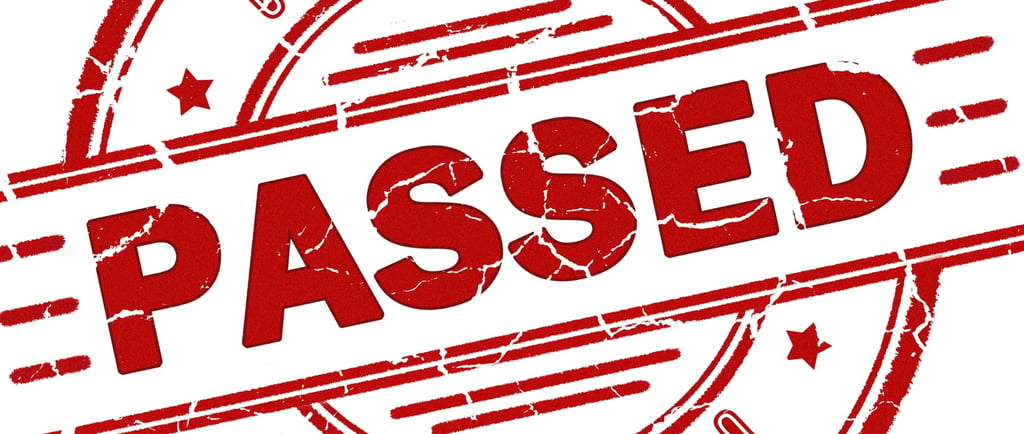Choosing a Home Inspector: Not a Pass or Fail
When it comes to buying a home, the inspection process is one of the most critical steps. But one common misconception among homebuyers is that a home inspection is a “pass or fail” test. In reality, an inspection is simply a comprehensive evaluation of a property’s condition—not a judgment of whether you should or shouldn’t buy it. Choosing an inspector who provides objective, fact-based findings, without giving their personal opinion, can make a huge difference in your decision-making process.


When it comes to buying a home, the inspection process is one of the most critical steps. But one common misconception among homebuyers is that a home inspection is a “pass or fail” test. In reality, an inspection is simply a comprehensive evaluation of a property’s condition—not a judgment of whether you should or shouldn’t buy it. Choosing an inspector who provides objective, fact-based findings, without giving their personal opinion, can make a huge difference in your decision-making process.
Here’s why it’s important to select a home inspector who sticks to the facts and avoids inserting personal opinions.
An Inspection is Not a Pass or Fail
Contrary to popular belief, a home inspection doesn’t give your home a passing or failing grade. Instead, the goal of the inspection is to identify the current condition of the home and highlight any potential issues or areas of concern. The job of a professional inspector is to report these findings accurately, so you can make an informed decision about the property—whether that means moving forward, renegotiating, or walking away.
The final decision, however, is always yours. It’s not the inspector’s role to tell you what to do.
Objectivity Matters
A qualified home inspector presents objective, fact-based information about the home. They focus on pointing out visible problems or potential future concerns without imposing their personal opinion on whether you should buy the home. For example, an inspector may find that the roof will need replacement in the next few years, but it’s not their job to tell you whether that’s a deal-breaker for your purchase. The facts should help guide your decision, but ultimately, you have to weigh those findings against your own priorities, budget, and plans for the home.
The Role of the Inspector: Just the Facts
A home inspector’s job is to assess a wide range of components in the home—such as the foundation, plumbing, electrical systems, HVAC, roof, and more—and present their findings in a clear, factual manner. Here’s what you should expect from a quality inspection:
Thorough Evaluation: The inspector should evaluate all accessible areas of the home and look for visible issues or potential concerns.
Clear Documentation: Expect detailed reports with photos and descriptions, outlining the condition of the home’s various components.
No Personal Bias: The inspector should avoid statements like “I wouldn’t buy this house” or “This is a great buy.” Their role is strictly to inform you about the property’s condition.
An inspector who sticks to the facts allows you to make your own decision based on your individual needs, financial situation, and comfort level.
Why Opinions Can Be Misleading
While it might seem helpful to have an inspector give their opinion on whether the home is a good buy, it can actually lead to confusion or misunderstanding. Every buyer has different deal-breakers and different thresholds for what they’re willing to address or repair. What one inspector might personally consider a big issue may be something you’re prepared to handle, and vice versa.
For example:
Old Windows: Some inspectors might view outdated windows as a major issue, but if energy efficiency isn’t a priority for you, this may not affect your decision.
Dated Plumbing: An inspector might point out that a home has dated plumbing. While this might seem like a big deal to one person, maybe the buyer is a plumber or knows one well, making this an easier fix for them.
By leaving personal opinions out, the inspector ensures you receive a clear, unbiased report that allows you to focus on what’s important to you.
Why Choosing an Unbiased Inspector is Key
When selecting a home inspector, it’s important to choose one who adheres to a code of ethics and avoids personal biases. Professional inspectors are trained to provide a factual assessment of the home’s condition, ensuring that their findings are based on industry standards and the actual state of the property.
An inspector who offers opinions instead of facts can unintentionally influence your decision in a way that doesn’t align with your own goals. You want someone who respects the fact that you, as the buyer, are in the best position to decide whether a home fits your needs or not.
At the end of the day, a home inspection is about arming you with the knowledge you need to make an informed decision. It’s not about whether the home passes or fails—it’s about understanding the true condition of the property so you can plan your next steps with confidence.
When you choose a professional inspector who presents clear, unbiased information, you’re in the best position to make the right choice for your future home. After all, it’s your investment, and the final decision is yours to make.
For a detailed, fact-based home inspection, Just Call Joe Inspections. We’re here to help you see the full picture, without the opinions.